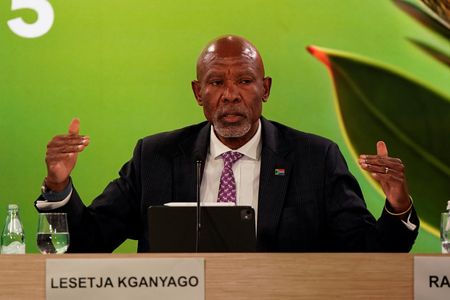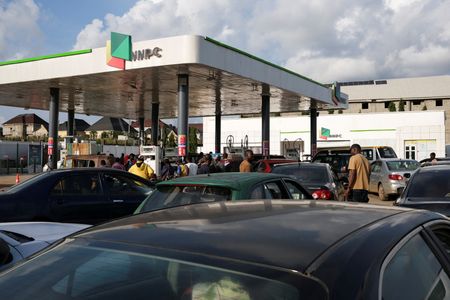By Kopano Gumbi
JOHANNESBURG (Reuters) -South African Reserve Bank Governor Lesetja Kganyago said on Thursday there was no reason to delay a push for a lower inflation target to 3% despite persistent pockets of inflationary pressure from administered prices and wages.
Kganyago told Reuters that sticky administered prices for electricity and water, as well as multi-year public-sector wage agreements, should not delay efforts to lower the target.
“There have been wage agreements that have been set up over three years, for example, those must still work themselves out of the system, but you can’t wait for them to expire before you set the target,” he said.
Administered prices are those fixed by regulatory authorities based on costs rather than market forces.
Kganyago has advocated lowering the inflation target for over a year, arguing the current 3-6% target band is uncompetitive and misaligned with international peers.
Finance Minister Enoch Godongwana has not formally adopted a lower target, but in July the central bank said it would focus on the bottom of the current band.
Critics have accused the central bank of acting ahead of the National Treasury on this matter. However, Kganyago remains firm, citing bond yield movements as evidence of maintained credibility.
South Africa’s benchmark government bond yields have fallen between 80 and 160 basis points since April, central bank data showed.
“The Minister of Finance and Governor wouldn’t issue a joint statement and nail their colours on the mast, if they do not trust each other, which is why I keep emphasising that we have found each other,” Kganyago said.
Ratings agency Fitch has forecast that the National Treasury may announce a lower target during the mid-term budget on November 12.
A key concern for Treasury is how revised inflation figures might impact revenue and expenditure projections in the medium term.
While inflation has performed better than expected this year, Kganyago flagged ongoing risks, including geopolitical uncertainties that could affect the rand and inflation outlook in 2026.
The South African currency has strengthened against the dollar in 2025, though Kganyago warned that gains may be temporary.
(Reporting by Kopano Gumbi, editing by Ed OsmondAdditional reporting by Olivia KumwendoEditing by Colleen Goko, editing by Ed Osmond)










